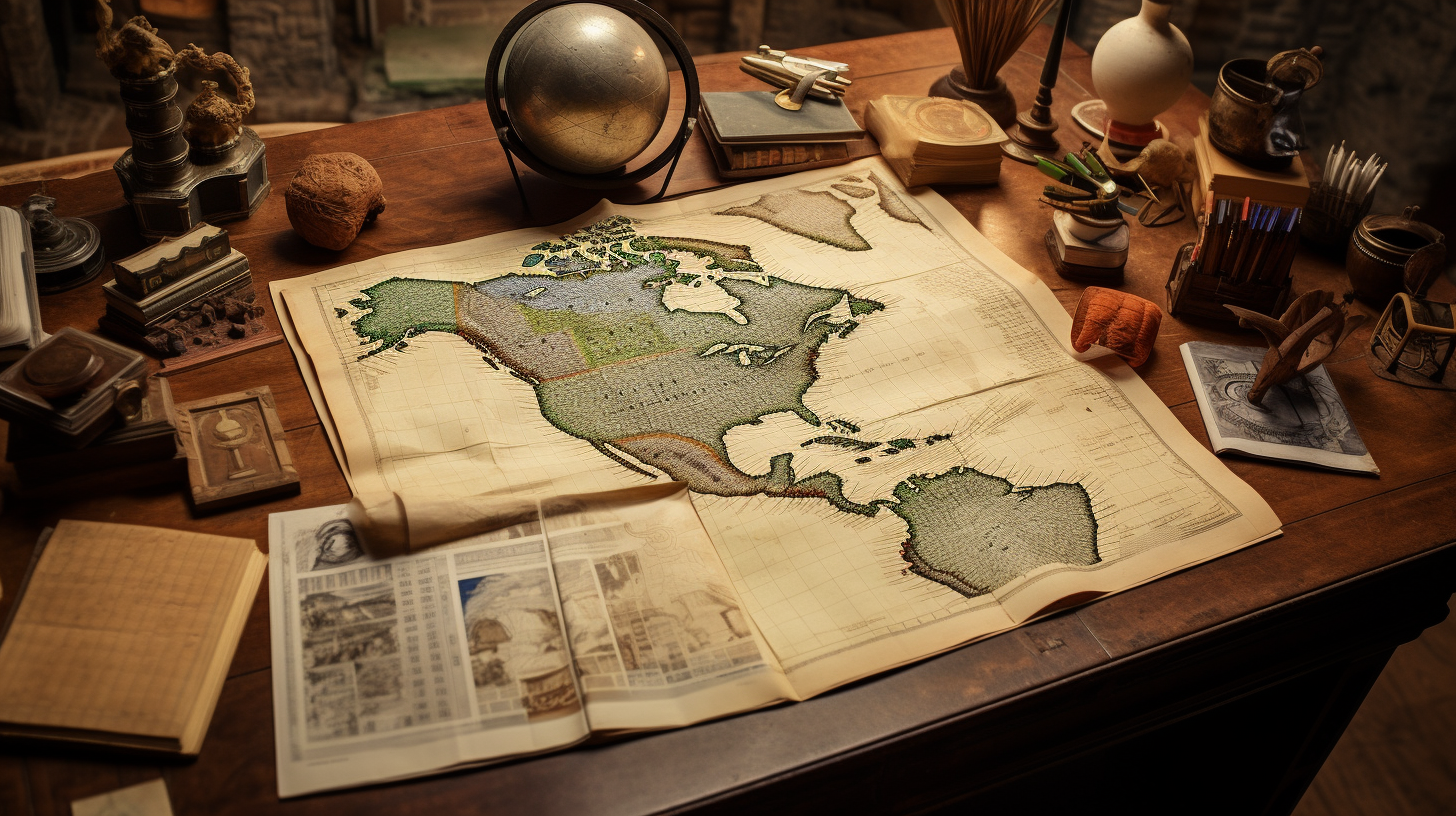
Articles

Mexican States
Southwest United States
Heritage and Governance
The Indigenous People of California: Past and Present
Explore the untold story of California’s Indigenous peoples - from ancient languages and tribal lands to colonization, resistance, and survival. This detailed report follows their journey across centuries of upheaval and resilience.
The Santa Ynez Mission Indians: Their Struggle for Land
This article explores the origins, languages, and history of the Chumash people, with special attention to the Santa Ynez Mission. We take you through the Mission years, the Secularization, and the subsequent dispute in which the Catholic Church saw the natives as squatters who needed to be evicted from church land [i.e., the Church Lawsuit from 1897 to 1906]. Today, the Santa Ynez Band of Chumash Indians is a federally recognized Native American tribe that has witnessed great success in recent decades, a remarkable transition from the 1890s and Early Twentieth Century.
Indigenous Mexican Migrations
This article explores the migrations and diasporas of the Native Americans of the Uto-Aztecan Language Family. Over a period of several centuries, multiple Native American cultures ventured beyond their homelands for multiple reasons: 1) to seek gainful employment as settlers and laborers in a new region, 2) to escape persecution from the colonizer, or 3) as both forced and voluntary soldiers of the Spaniards.
Indigenous Conflicts Along the Rio Grande
For the better part of a century, both sides of the Rio Grande feared Indigenous raids that led to increased tensions and retaliatory raids. Many treaties and alliances were made and broken.
Boundaries between countries were not only in flux, but almost totally ignored by some of the more aggressive Indigenous groups [the Comanches and Apaches]. However, after several decades, the Indigenous threat to Texas from sanctuaries in Mexico would end with six cross-border campaigns against the Kickapoo and Lipan Apache in 1873 and 1876-1878.
Early Orange County History
Before the land was parceled into cities, ranchos, and suburbs, what we now call Orange County, California was home to Indigenous nations whose presence stretched back thousands of years. The Tongva (often called Gabrieleño), the Juaneño (Acjachemen), and the Luiseño each held territory here. We trace the region’s transformation from Indigenous homelands to Spanish mission territory and, later, to Mexican ranchos. We examine the impact of colonization, beginning with the 1769 expeditions and the establishment of the mission system.
Nine Generations of Californians: Serving Under Three Flags
Juan Matias Olivas came as a soldier to California in the Expedition of 1781. Juan’s generation was the first of nine generations to serve as military men in California. This article discusses the service of fourteen members of this family. Three of these individuals died while in the service (two of them were killed in action). We tell their story and pay tribute to their service to the people of California. From 1781 to 1985, the flags, the causes, and the surnames changed, but the Olivas family's legacy of military service to California has endured.
Resources for Tracing Your Spanish Ancestors in Colonial Mexico
The following presentation offers suggestions for tracing your Mexican ancestors back to Spain or Portugal. Learn how to navigate key databases and archives that reveal not only where your ancestors lived in Mexico but also trace their journeys back to specific regions in Spain or Portugal. Learn about tools that identify conquistadores, missionaries, and settlers who shaped communities across Nueva España.
The Expedition of 1781
This presentation explores the historic “Expedition of 1781” which led to the eventual Spanish settlement of Los Angeles, Santa Barbara and San Buenaventura. Discover the challenges faced by the soldiers and settlers of that expedition and their role in shaping Southern California's early development. Today’s sprawling metropolis of Los Angeles and its surrounding regions is the result of the Expedition of 1781.
Mexican American Identity
There are 38 million Mexican Americans, comprising over 11% of the U.S. population. But for most of American history, Mexican Americans made up a small minority of the population. For the last two centuries, Mexican Americans have gone through a series of different labels that have tested their citizenship, social class, and heritage in the United States. This article reveals how Mexican American identity has changed over time.
The Surname Ledesma in Mexico
The surname Ledesma has been present in Mexico for five centuries. It had multiple origin points in España (Spain), and many Ledesma’s left Spain in the 16th and 17th centuries to settle in Mexico. In Mexico, Ledesma’s came to Puebla, Chihuahua, Jalisco and Guanajuato. This article explores the early years of the Ledesma families in Mexico. Many Ledesma’s have great pride in their ancestral heritage, which is clearly evident in the yearly Ledesmada Guanajuato Reunion held each year in Valle de Santiago, Guanajuato.
Searching for Your Indigenous California Ancestors
There are many methods of exploring your Indigenous California Roots. These include the California Mission Indians Records (Baptisms, Marriages & Burials) and the Huntington Library’s California Early Population Project. But the National Archives (NARA) can also be very helpful. It is also important for people to know that Ancestry.com has a database for all the Indian Censuses between 1885 and 1940. Finding that your ancestors were listed in this census could help you locate more information.
Indigenous Jalisco in the Sixteenth Century: A Region in Transition
The State of Jalisco is the ancestral home of many Mexican Americans. However, very few people much about the history of Jalisco’s Indigenous people. Five centuries ago, the State of Jalisco had a very dynamic and diverse Indigenous population, but that changed with the conquests of Nuño de Guzmán. In this article, we explore the native groups that inhabited every corner of Jalisco in the Sixteenth Century. Today, they live on through you, their descendants.
Mexican Colonial Migration as a Catalyst for Assimilation (1550-1821)
For centuries, Mexico has led the world in silver production. In 1546, during Mexico’s colonial period, silver was first discovered in Zacatecas, but many more mines would be opened up in the next two centuries. According to Michael M. Swann, “Migrants in the Mexican North,” the “silver centers attracted large, mixed populations from great distances.
The Chinese Experience in Mexico
Discover the rich and complex history of Chinese immigration to Mexico. From the Manila Galleon trade in the 1570s to modern-day communities like La Chinesca, we delve into the contributions, challenges, and cultural integration of Chinese immigrants over centuries.
The Indigenous Legacy of Sinaloa
Sinaloa, a northwestern Mexican state, is known for its fertile lands, seafood, and Banda Sinaloense music, yet its Indigenous roots are often overlooked. Spanish conquest brought drastic changes through genocide, epidemics, missionization, and mestizaje, with settlers like Castilians, Basques, Africans, Purepechas, and Nahuas reshaping the region. Over time, Sinaloa became one of Mexico's most Mestizo states. Today, the Mayos (Yoremes) are the only pre-Hispanic native culture remaining.
The Enduring Legacy of the Yaquis: Perpetual Resistance (1531-1927)
The Yaqui People are among the most resilient in history. From 1531 to 1927, they viewed all “Yoris” [Spaniards and Mexicans] with suspicion. After converting to Christianity in the 1600s, they cooperated with Jesuit priests until 1767. Following Mexican independence in 1821, they endured nearly a century of warfare with the Sonora and Mexican governments, seeking autonomy but facing warfare and deportation under President Porfirio Díaz. Today, they live in peace but continue to face challenges, with their legacy defined by resistance to protect their land.
Who Were the Chichimecas? Exploring Their Legacy
The nature of the so-called Chichimecas has varied in time and place. Originally the Spaniards and their Indigenous allies referred to the semi-nomadic people who inhabited the frontier area of Nueva Galicia as Chichimecas. They waged a 40-year-war against them. But two hundred years later, the Spaniards also used the term for the nomadic Coahuiltecan tribes of the northeast.
The Dominguez Family’s Journey from Zacatecas to Kansas
The Nineteenth Century Dominguez Family of Zacatecas became an American family in Kansas City during the Twentieth Century. From 1862 to 1946, four generations of the family went from the silver mines of Zacatecas to the meat-packing plants of Kansas City. The family worked hard, raised their children, worshipped their God, and served in the military for their adopted country. Take a journey with us in watching their gradual evolution into a patriotic American family, witnessing some of the pitfalls they endured along the way.
Lagos de Moreno: The Gateway to Jalisco
Lagos de Moreno, located in the northeast corner of the Mexican state of Jalisco, is an important commercial hub in the central Mexico region. While Aguascalientes lay eighty miles to the northwest, the city of Leon (in Guanajuato) is only forty miles to the east, and Mexico City is 445 miles to the south. Lagos de Moreno represents one of the twenty-four municipios that makes up the Los Altos region of Jalisco, an area that is defined by its socioeconomic and geographic nature and shares a common cultural history.
The Roots of the Luevano Family in Aguascalientes
Follow the fascinating genealogical journey of the Luevano family, from their Basque origins in Spain to their establishment in early Aguascalientes, Mexico. Trace 11 generations through centuries of marriages, migrations, and connections with other prominent colonial families, culminating in their migration to the United States during the Mexican Revolution.

Article Categories
- Aguascalientes 14
- Arizona 4
- Baja California 5
- Baja California Sur 2
- California 19
- Campeche 4
- Census 36
- Chiapas 3
- Chihuahua 11
- Coahuila 7
- Colima 1
- Conquistador Chronicles 2
- Durango 2
- Ethnic Identity 40
- Genealogy 35
- Guanajuato 8
- Guerrero 8
- Hidalgo 2
- Indigenous Insights 97
- Jalisco 25
- Mexico City 11
- Michoacan 7
- Morelos 4
- Nayarit 3
- New Mexico 4
- Nuevo Leon 7
- Oaxaca 6
- Politics 10
- Puebla 5
- Queretaro 1
- Quintana Roo 4
- San Luis Potosi 11
- Sinaloa 6
- Sonora 16
- Southwest US 26
- State of Mexico 5
- Tabasco 3
- Tamaulipas 11
- Texas 7
- Tlaxcala 7
- Veracruz 6
- Yucatan 6
- Zacatecas 13





















